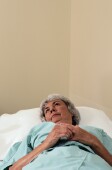
MONDAY, Jan. 24 (HealthDay News) — A brief, individualized counseling program can improve sleep in older adults with insomnia, a new study shows.
The research involved 79 insomnia patients, with an average age of about 72, who were divided into two groups. The 39 patients in the treatment group received four sessions of individualized behavioral counseling from a nurse clinician. Two sessions were conducted in person and two by phone.
The 40 patients in the control group received only general printed educational material about insomnia and sleep habits.
After four weeks, more patients in the behavioral treatment group than the control group showed a favorable response (67 percent versus 25 percent) or no longer had insomnia (55 percent versus 13 percent).
The results suggest that for every 2.4 patients treated with the counseling program, one would respond favorably and one would no longer have insomnia, said Dr. Daniel J. Buysse, of the University of Pittsburgh School of Medicine, and colleagues.
The study is published online Jan. 24 and in the May 23 print issue of the journal Archives of Internal Medicine.
Up to 35 percent of older U.S. adults have insomnia, according to background information in the article. Because of trouble falling asleep or staying asleep, they may complain of daytime fatigue, difficulty concentrating and mood disturbances.
“Although brief behavioral treatment for insomnia shares many features with other behavioral insomnia treatments, some particular features make it an especially attractive option,” the researchers wrote in a journal news release.
They said the strong focus on behavior may reduce patient concerns about “psychological” treatments. Also, the program can be taught to nurses in a short period of time, the authors said.
More information
The U.S. National Heart, Lung, and Blood Institute has more about insomnia.

